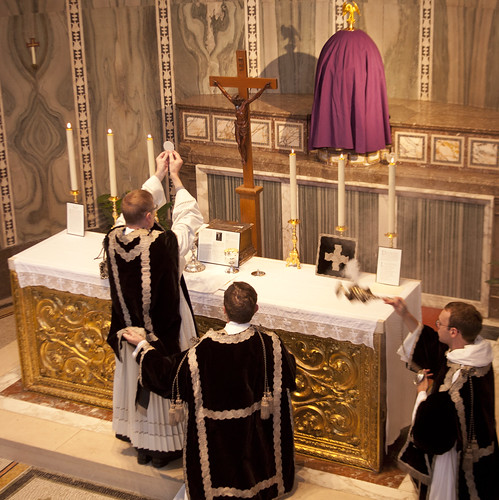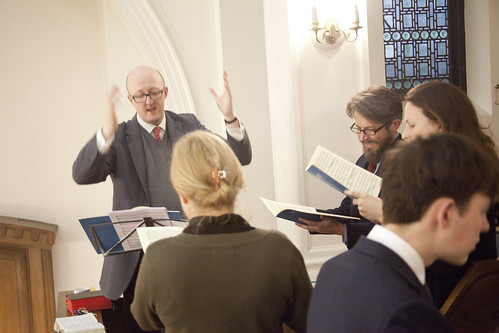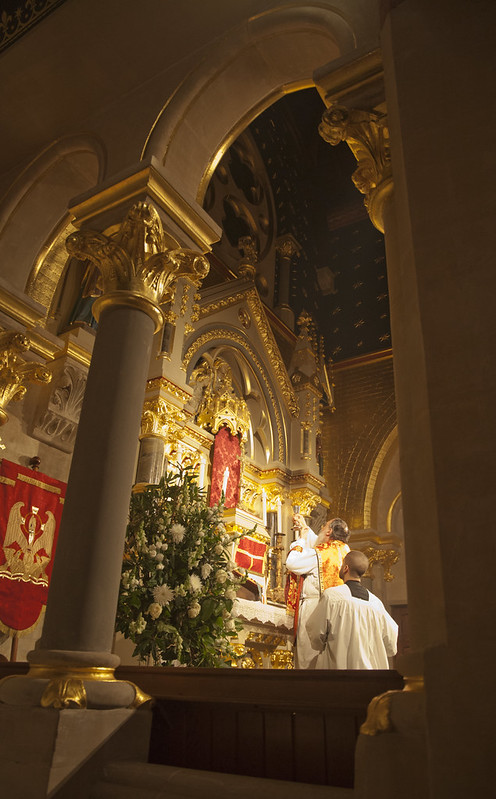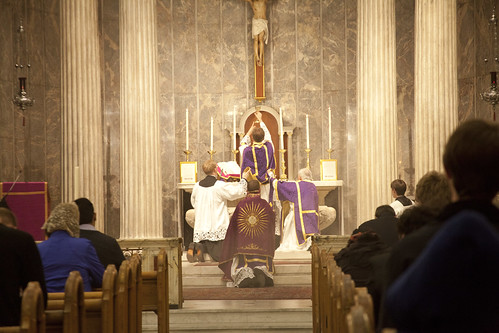Chairman's Blog
Gregorius Magnus, magazine of the FIUV: new edition available
Want a break from the US election?
You can read a good dal about the response of the Foederatio Internationalis Una Voce (FIUV) to the survey of the world's bishops on the Traditional Mass carried out by the CDF earlier this year in the newly published magazine of the FIUV: Gregorius Magnus 10.
Having recently returned from Rome, I can say from multiple sources that what the bishops have said about the EF in their dioceses is not all negative by any means, and no one seems to expect any bad outcomes from this survey. Nevertheless, the FIUV has also presented the CDF with a report, covering 368 dioceses from 52 countries, of the experiences of the traditional faithful, whether in enjoying the Traditional Mass or merely asking for it, to supplement the perspective of the world's bishops.
Gregorius Magnus also has much else of interest which I hope readers will appreciate, including extracts from traditional Catholic magazines from around the world, some published in English for the first time.
It is now available as a pdf here.
Coronavirus restrictions and Mass-going
 |
| A be-masked Supply of Ceremonies Omitted in the Private Baptism in Oxford last weekend. |
A lot of people are very upset about the obligation to wear masks, particularly in church. Certainly, there is something a bit weird and oppressive about being obliged, nor for any religious or symbolic reason—for example as a sign of mourning—to cover one’s face, and to see everyone around one doing the same. I can’t say I’m happy about my four-month old baby not being able to see me smiling at her during Mass.
Perhaps the public health arguments in favor of masks are justified, and perhaps they are not. I’m not qualified to take a view on that, but equally I’m not one to insist on the most stringent interpretation of the rules where there is room for maneuvre.
What I determined to do, however, is to make the most of what freedom there is to maintain my own sacramental life, and to help others to do the same. The Latin Mass Society is organizing and facilitating events to the maximum amount allowed. Most parishes and dioceses are doing the same. If the Government says something is allowed, after all, then it is allowed.
So, insofar as Mass is allowed, insofar as the normal and worthy service of the altar is allowed, the normal distribution of Holy Communion, singing, confession, and public baptism, then we will have them.
It was a huge relief to be able to return to Mass, after months of watching online, even if this meant donning a mask, sanitizing one’s hands, and keeping a distance from other households. I know, however, that not everyone has embraced the chance to return to Mass—not only the sick and vulnerable—and some who did so at first have become weary, or angry, about the continuing restrictions. The more zealous Catholics, perhaps those reading this article, are not easily put off meeting Christ in the liturgy, and receiving Him in Holy Communion, but perhaps it is also the more zealous Catholics who are most sensitive to the restrictions. When we are in God’s house, there is something particularly painful about feeling one is under irksome, invasive, and possibly arbitrary and absurd regulation from the secular power. There is something offensive about it.
What I would like to say, however, is that we should not be put off. The way to respond to these restrictions is to do the most we can, within them, and not to let them stop our devotions. We can, also, complain to those responsible for them, and remember that such complaints have not entirely been in vain up to now.
Thus, after a lot of debate and upset the Catholic Bishops of England and Wales seem to have accepted that they can’t stop people receiving Holy Communion on the tongue, at least ‘outside Mass’—even if that just means immediately after Mass. Don’t expect them to admit publicly they were wrong: just pocket the concession.
Even more impressively, when the UK Government announced that public liturgies would again be banned, the President and Vice President of the Bishops’ Conference wrote a letter of protest: a sharp contrast to their attitude in the first lockdown, when they actually advised the Government to impose a ban on public services.
For the moment at least, these are battles English Catholics have won. We should be happy about that, and press for more concessions. This isn’t the moment to give up on going to church altogether.
Our priests, applying these rules—perhaps absurd, perhaps oppressive—are certainly not doing so to annoy us or to restrict our access to the Sacraments. They can be, and in some cases have been, denounced, to the police, to hostile media, and to their bishops, for real or imaginary infringements of the rules. We share the planet, unfortunately, with people who are frightened, perhaps irrationally, about the virus, and also with people who will use any weapon which comes to hand against the Church, or those they dislike within her. If priests have to do some silly things to give us the sacraments, think of the priests of penal times wearing disguises, or pretending to be the gardener.
Many of our predecessors in the Faith risked their freedom or even their lives to attend Mass. Some went into exile. Some travelled long distances on foot. Their privations should instruct us: we should not give up the Mass lightly, because we think masks unjust or annoying.
It is also something we owe to our priests. They need our support, financial, and even more, moral. If they take a different view from us, even about something as important as the reception of Holy Communion, we can go to other parishes, certainly, but we must also respect their sincerity, and equally their limitations. Yes, they may be weak: so are we all. As St Paul exhorts us, ‘bear ye one another’s burdens; and so you shall fulfil the law of Christ’ (Gal 6:2). And we must embrace the sufferings which come to us in our ordinary lives, and with St Paul, ‘rejoice in my sufferings for you, and fill up those things that are wanting of the sufferings of Christ, in my flesh, for his body, which is the Church’ (Col 1:24).
UK Government consults on regulating home-education
From an email
This will inevitably result in state interference in what and how parents teach their children at home, in the same way that the RSE and LGBT agendas have been imposed on schools.
The Christian Institute have produced a very good short briefing on the matter setting out the key issues at stake and suggestions of best way to respond in the consultation:
https://www.christian.org.uk/wp-content/uploads/Home_Education_briefing_Oct20.pdf
The consultation itself is here (I understand the proposals only apply to England though anyone can respond):
https://committees.parliament.uk/call-for-evidence/255/home-education/
Big Tech turns Big Censor
My latest on LifeSite.
Some weird things have been happening online recently. If you search for certain words or phrases on Google, you are directed not to the website or news story about the thing you are searching for, but a series of sources attacking or debunking it. When you try to post about certain things on Twitter or Facebook, your followers see your words accompanied by a link to an article attacking what, according to some algorithm, you may be promoting, or else you can find yourself suspended or banned from the platform.
I’m not talking about searching for racist political parties, pornography, or how to make a bomb. This happened to the ‘Great Barrington Declaration’, a statement by a group of scientists about government policy on the coronavirus. Even with the weight of the New York Post behind it, a major story about Hunter Biden, the son of the Democratic Presidential candidate Joe Biden, disappeared from social media and Google results. Even tweets by President Donald Trump have been vanishing. Rather than expressing concern over this, or countering its effects, mainstream media outlets have in many cases been following the tech companies’ lead in burying particular stories.
The intolerance of the tolerant towards Judge Barret
My latest on LifeSite.
A member of presidential candidate Joe Biden’s staff made a revealing statement on Twitter the other day. Arguing that Amy Coney Barrett reportedly believes that the husband should be the head of the household, someone pointed out that this is also part of the traditional faith of Jews and Muslims.
Nikitha Rai (@RaiNotWheat), deputy director of data for the Biden campaign, replied:
True, I’d heavily prefer views like that not to be elevated to SCOTUS, but unfortunately our current culture is still relatively intolerant. It will be a while before these types of beliefs are so taboo that they’re disqualifiers.
She’s deleted her account, but the internet remembers.
Sir James MacMillan becomes Patron of London-based choir Cantus Magnus
Support Sacred Music in London and Offer Masses for Your Loved Ones
Cantus Magnus, a professional sacred music choir under Matthew Schellhorn, is announcing a scheme whereby anyone can ask for a Sung Requiem Mass to be celebrated for their loved ones, to be fitted in to or added to the regular EF Masses which are celebrated in London.

In Defence of Primary Educators: a protest against Sex Ed in Catholic schools
Below is a piece I've written for LifeSite on the campaign against Sex Education in Catholic schools. Our Coalition in Defence of Primary Educators now has a website, and with LifeSite we have created the following video.
Last week, on the Feast of the Holy Name of Mary, I knelt with two others in front of Westminster Cathedral, the magnificent Byzantine-style mother-church of the premier diocese of England and Wales, and the seat of Britain’s only Cardinal, Vincent Nichols. We prayed the Rosary together for our bishops. We had already written to them: we, and supporters or our three organisations, which have come together for this cause—the Society for the Protection of Unborn Children, Catholic Man UK, and the Latin Mass Society, of which I am the Chairman—and we received formulaic responses from most of them, telling us that everything will be fine.
But it is already not fine, and we can all read for ourselves the legislation and official guidance which will before long be enforced on schools under our bishops’ authority, which will make things even less fine. For this legislation is imposing a program of “Personal, Health, and Sex Education” (PHSE) which demands that choosing not to kill the child in the womb is just one acceptable option among others, and that Christian marriage is just one life-style choice alongside same-sex unions, and every other possibility. We know from the lesson-plans, produced not only by the Government but by the Bishops’ own agency, the Catholic Education Service, that children in schools claiming to be Catholic and funded in part by Catholic offertory collections are already bullying, browbeating, and shaming children who dare to give voice to their instinctive regard for natural marriage. This approach will be rolled out and enforced with greater and greater rigor when the new legislation comes into force next year, after a delay caused by the Coronavirus.
Schellhorm Prize for sacred music composition
The Trustees of the Schellhorn Trust are pleased to announce the 2020 Schellhorn Prize for Sacred Music Composition competition.
Classical pianist Matthew Schellhorn founded the prize in 2014 in memory of his parents to foster artistic endeavour and encourage excellence in the Sacred Liturgy. The inaugural Prize was awarded in 2015 and was won by Marco Galvani.
The Schellhorn Prize for Sacred Music Composition competition is announced for 2020 and will be held in December with the winning entry performed on Christmas Eve.
The panel of judges for the 2020 Prize will include:
Mr Matthew Schellhorn (Chairman)
Diana Burrell (composer)
Marco Galvani (composer; Yehudi Menuhiin School)
Dr Peter Kwasniewski (composer)
Professor Nicola Lefanu (composer)
Mr Andrew Morris (Pastmaster, Worshipful Company of Musicians)
Mr Tim Watts (composer; Affiliated Lecturer, Faculty of Music, University of Cambridge & Sub-Director of Studies in Music and Teaching Associate, St John’s College, Cambridge)
The Schellhorn Prize for Sacred Music Composition is supported by The Latin Mass Society of England and Wales.
Guidance for entry
What does the Prize offer?
One £400 prize will be awarded in 2020.
The winner will also have his or her composition performed by a professional choir in the context of the Sacred Liturgy of the Catholic Church according to the Missal promulgated by Pope Saint John XXIII in 1962.
In 2020, the composition will be performed during Mass on Christmas Eve at St Mary Moorfields Catholic Church in the City of London. (Should the Covid-19 situation preclude this performance, another performance opportunity will be arranged.)
Who is it open to?
Composers aged between 18 and under 30 or under on the closing date, regardless of nationality, who are studying, or have studied, at any conservatoire or university in England or Wales.
What are the entrance requirements?
A piece for a cappella SATB choir (four parts, non-dividing) using any Latin Eucharistic or Christmas-themed text (excluding the text of the Mass) must be submitted with the completed application form.
The piece should be no longer than 5 minutes long and should not have received its premiere.
The piece should be accompanied by a copy of the text and a summary in no more than 200 words of the work's artistic rationale.
Proof of age and of educational status from your place of study are also required.
How do I apply?
Download an entry form below.
Applications must be made on the official form and emailed to the address given.
As a contribution to the administrative costs of the award, an entrance fee of £5 per piece is payable.
Members of the Latin Mass Society and those in full time education at the closing date are not required to pay the entrance fee.
When is the next closing date?
Entries should be submitted by Monday 7th December 2020 at 5pm.
When will the winner be announced?
The Winner (and Honourable Mentions if applicable) will be announced on Monday 14th December 2020.
Westminster Cathedral Choir is in peril
 |
| Westminster Cathedral: the LMS Annual Requiem |
The saga of Westminster Cathedral Choir School claimed a fresh victim last week with the resignation of another senior employee, the Music Administrator Madeleine Smith. Like the Director of Music, Martin Baker, she was unhappy about the sidelining of the choir at England’s premier Catholic Cathedral. Baker resigned late last year, and was absent from Christmas services. There was no official explanation, and he has not been replaced. What is going on?
Westminster Cathedral Choir is served by men and boys, in the ancient Catholic tradition. The boys attend a school set up specially for them by Cardinal Vaughan, the founder of the Cathedral, in 1902. He wanted to have something in his new Cathedral equivalent to the great choirs of the Anglican Cathedrals, which commonly have their own schools—boarding schools—so the boys can be recruited from a wide area and are available to sing on Sundays. Vaughan’s vision was realized, and Westminster Cathedral Choir is famous. It is, or was until recently, at least as good as the best Anglican Cathedral choirs, such as those of Westminster Abbey and St Paul’s, and in the context of the global melt-down of Catholic sacred music since the 1960s, it was regarded as the best Catholic Cathedral choir in the world. Westminster Cathedral was the only Catholic Cathedral in the world to have a Sung Mass every single day: again, until recently.
Just as Cardinal Vaughan and other Catholic leaders over millennia wanted to build the most beautiful churches possible, and have in them the most moving devotional art, so too they wanted the best sacred music. The greatest achievements of the human spirit should be offered to God, and our acts of worship should be clothed in the best we can offer Him. Art and above all music has the power to touch the heart, to get through to us when words fail, to express our awe, our joy, and our sorrow, and as Pope John Paul II expressed it, can be ‘an echo of the Spirit of God’ (Ecclesia in Europa (2003) 60).
I know this kind of argument confuses some people. If the best we can do is not all that great, it will be acceptable to God: because, yes, He looks at the heart. If the best we can do is reserved for mindless secular entertainment or commercial ends, God will be less impressed. What does it say about us as a society that the best efforts of artists are devoted to making violent and immodest films? What does it say about us as individuals if our home entertainment systems are more expensive than the altar furnishings in our churches?
So what has happened in Westminster Cathedral? As reported in The Times, the key change has been a new Head Teacher of the Choir School, of which the choristers now only represent 10%, who has abolished full-time boarding for choir members. Allowing them to go home on Saturdays may seem uncontroversial, but in fact they are obliged to go home, so the school is no longer able to accept pupils from outside London, and Saturday rehearsals for Sunday services are impossible. As has been pointed out by many distinguished Catholic and non-Catholic musicians, the quality of the singing cannot be maintained under this regime.
Why would the authorities, bequeathed Vaughan’s astonishing legacy, not wish to make the most of it to raise worshippers’ hearts to God in prayer, and to draw non-believers into the Church? Knowing the debate as it has played out on these issues over decades, it is clear that there are two factors in play.
One is the desire of the school’s new leadership to make it a commercially and academically successful school. The emphasis is on getting the pupils, who leave at the age of 13, into elite “Public” (i.e. independent) schools such as Eton, where many of the UK’s Prime Minsters have been educated, including the present one.
The other is that, in the context of this temptation, Church authorities have no strong interest in maintaining the choir’s ability to sing to a world-class standard. Normally they would find the idea of competing with posh private schools a bit embarrassing, but they evidently find the idea of an elite choir even more so. The choir’s unique ability to sing the most complex and sublime pieces of the Catholic patrimony of Sacred Music in the way they were intended to be sung—by boys and men, rather than using adult professional female singers—pushes the Cathedral down a particular liturgical pathway which is not particularly congenial to them. They pay lip-service to the value of the choir but in some ways would be happier with a third-rate choir singing the kind of third-rate modern music which makes many Catholic worshippers flee for the hills. (I’ve written about the love of the mediocre here.)
We can only hope that some sanity returns before the damage to Westminster Cathedral Choir becomes irreversible.







